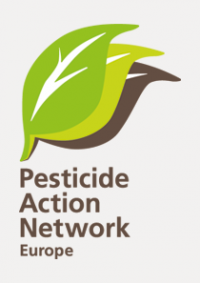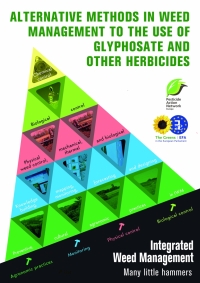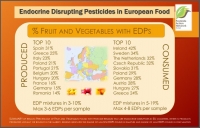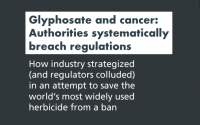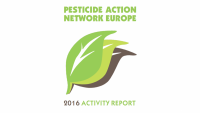Reports
PAN Europe's reaction to the assesment report on the sustainable use of pesticides Directive
PAN Europe reaction to the long-awaited evaluation report on progress in the implementation of Directive 2009/128/EC on the sustainable use of pesticides
Playground contamination study in South-Tyrol
South-Tyrol Organisation for Nature Conservation and Environment Protection, in collaboration with PAN Europe, recently published a report on the contamination of local playgrounds by pesticides from industrial apple production. Grass samples reveal that 40% of the playgrounds are contaminated by pesticides, exposing local children to toxic chemicals.
Glyphosate Dismissal - Technical Report
Regarding the manipulation of science in the toxicity evaluation of glyphosate, much has already been said: the Monsanto papers, the copy/paste affair from the dossier into the RAR and other incidents show that industry has largely influenced the analysis of available science in the dossier to guarantee the approval of its pesticide product for market use. In commissioning this report, Générations Futures and PAN Europe wanted to find out how studies showing negative effects of glyphosate are wrongfully (unscientifically) dismissed during the pesticide safety evaluation procedure.
Alternative methods in weed management to glyphosate and other herbicides
The present report aims to emphasise that we already have all the tools necessary to gradually start building a pesticide-free agricultural model and to confirm that weed control is possible using other means than harmful herbicides. The first edition was published in October 2017 has been revised in July 2018.
This report outlines the wide range of non-chemical alternatives to herbicides that are already available and used by groups such as organic farmers and those practicing integrated weed management (IWM). It highlights the critical need for mainstream farmers and growers to make much wider use of these tools, and the need to expand and improve current non-chemical tools while also developing novel approaches where current techniques are not effective enough. Using glyphosate-based herbicides as a reference, the current analysis presents a wide variety of weed management approaches that achieve highly effective weed control without the use of herbicides.
Read further in the revised version of July 2018>>
Endocrine Disrupting Pesticides in Food
Carcinogens in our food
EU policy provides that people are not exposed to carcinogens1. This means that alleged 'safe levels of exposure' (thresholds) shall not be applied to carcinogens and any exposure to these chemicals prevented. The industry sector has been attacking EU's policy on carcinogens for decades as one of their major lobby campaigns and has been promoting time and again the introduction of 'safe' thresholds.
Flaws in Glyphosate Toxicity Assessment
This report by PAN Germany's Senior Toxicologist, Peter Clausing, argues that in their assessments leading to the possible re-authorisation of Glyphosate, EU authorities failed to acknowledge its toxicity, using highly questionable arguments, and in clear violation of existing guidance documents.
Political decision-makers should not play along with the pesticide industry in this scientifically questionable and, as it seems, interest-driven game. Instead they should be objective in their assessment of glyphosate, ensure that the existing scientific evidence is evaluated correctly, and apply the precautionary principle to guarantee a high level of protection for humans and the environment.
The health of 500 million EU citizens is at stake.
(Please find versions in other languages: Italian; French; Spanish; German)
PAN Europe Annual Activity Report 2016
PAN Europe reports its major policy actions and campaigns in the year 2016.
Endocrine Disrupting Chemicals and Future Generations: Time for the EU to Take Action
Following the growing evidence on the hormone-related adverse health effects in human and wildlife due to exposure to endocrine disrupting chemicals (EDCs), the European Union has taken the initiative to regulate and minimise human and environmental exposure to these substances.
Impact assessment of the criteria for endocrine disrupting pesticides
Criteria could lead to no endocrine disrupting pesticide being banned at all
